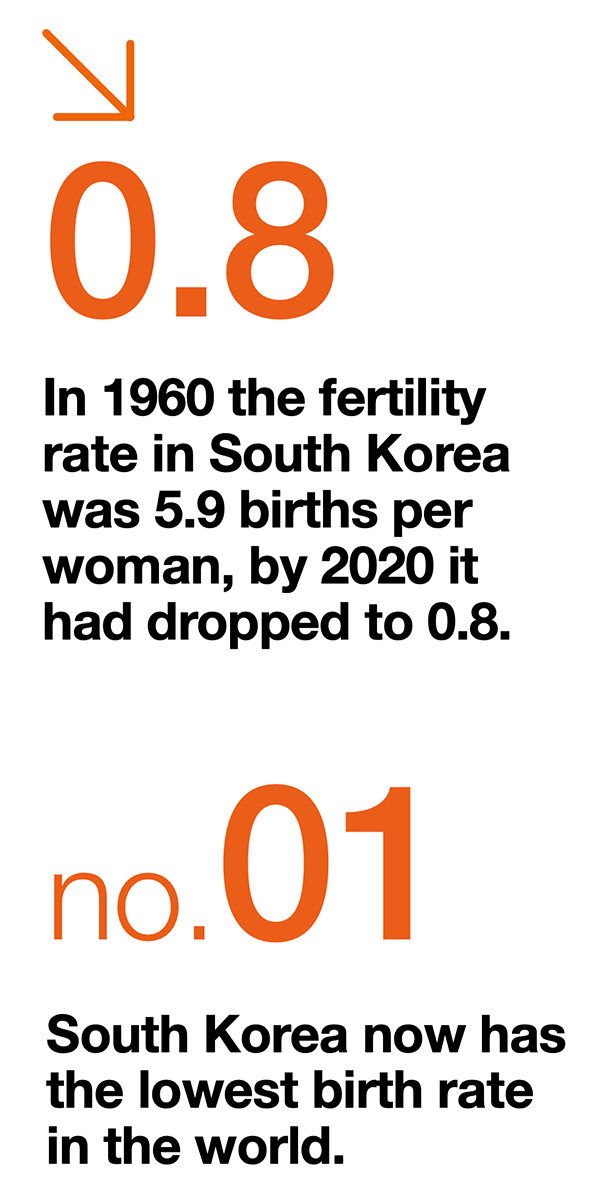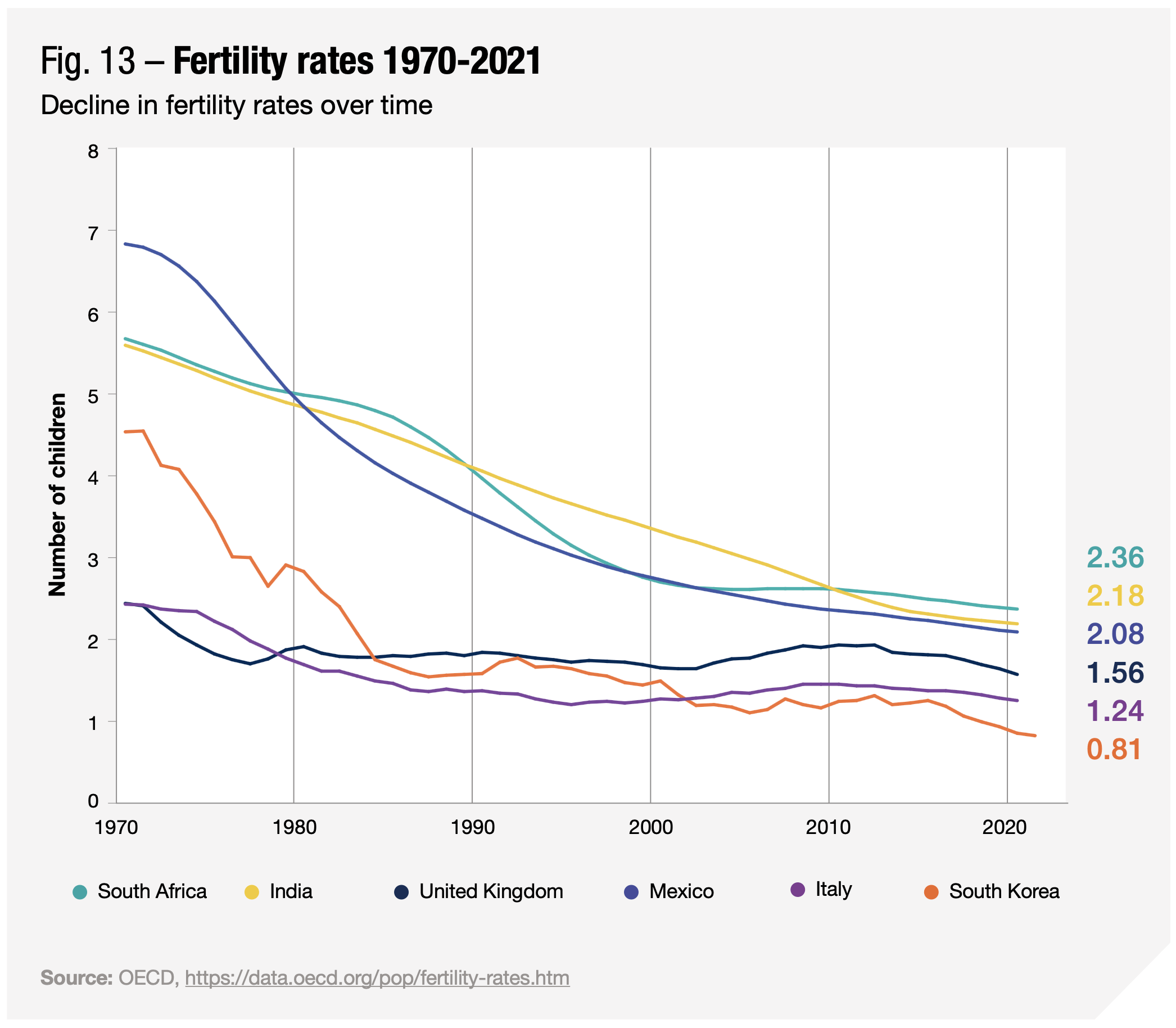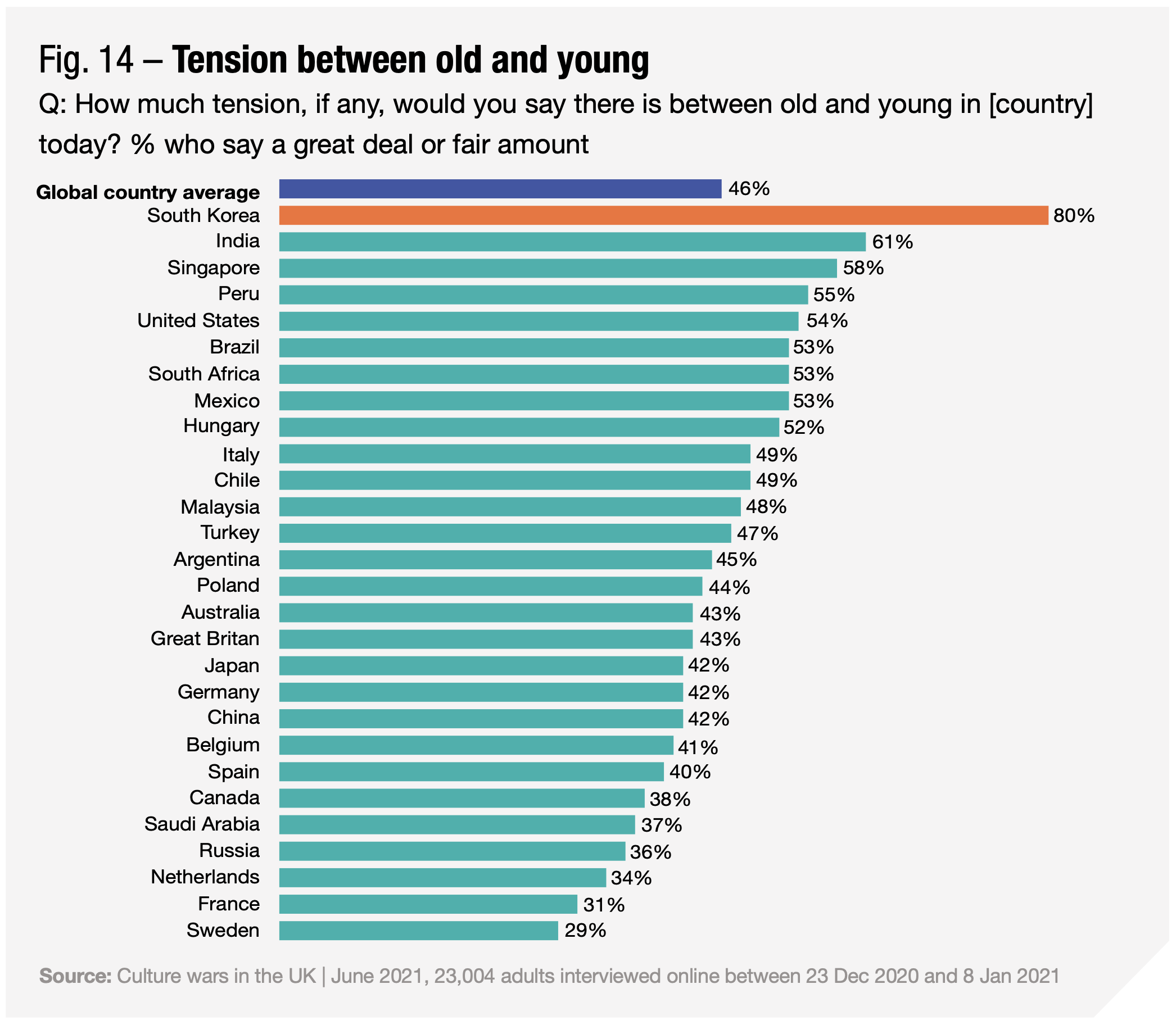

Super-ageing in post-pandemic South Korea
 Why is it important to understand generations now in South Korea?
Why is it important to understand generations now in South Korea?
 In around two generations, Korea has become a “super-ageing” society. Its birth rate is the lowest in the world – having gone from a fertility rate of 5.9 births per women in 1960 to 0.8 in 2020. Therefore, there is now a growing concern about the demographic “cliff” facing the country: fewer working people having to support more and more elderly people, and what this means for the economic implications of the country.
In around two generations, Korea has become a “super-ageing” society. Its birth rate is the lowest in the world – having gone from a fertility rate of 5.9 births per women in 1960 to 0.8 in 2020. Therefore, there is now a growing concern about the demographic “cliff” facing the country: fewer working people having to support more and more elderly people, and what this means for the economic implications of the country.
Additionally, Korea has a low influx of immigrants to make up for the low birth rate. The migrants entering the country are confined to low-paying jobs and are often left out of the national conversation.
 What is the main reason for declining birth rate in Korea?
What is the main reason for declining birth rate in Korea?
 First, it is economic factors that have put off young from having families – high real estate prices, the cost of education for children and greater economic anxiety.
First, it is economic factors that have put off young from having families – high real estate prices, the cost of education for children and greater economic anxiety.
On the other hand, there is also a trend to delay or avoid marriage. Marriage, childbirth, and childcare require too much sacrifice for women in a patriarchal society especially over the past decade. So, they are beginning to explore the possibility of being able to live well without getting married. Among those who were not dating, 51% of men and 64% of women said they chose not to date so they can enjoy their hobbies or focus on education. Many say they just don’t have the time, money, or emotional capacity to go on dates.
Lastly, there is constant failure of government policy to solve the low birth rate problems. Many experts believe the current throw-money-at-it approach is too one-dimensional and that what is needed instead is continuing support throughout the child’s life.
 How do Gen Z compare to Millennials?
How do Gen Z compare to Millennials?
The socioeconomic, technological environment may make a difference between Millennials and Gen Z. Both generations were digital-savvy kids, but Gen Z is truly mobile savvy since they are growing up with smart phone from primary school and live with social media every day.
On the other hand, both generations are highly educated and technologically adaptable, but Gen Z represent the country’s most vulnerable generation so far due to increasing job insecurity, unaffordable housing, and rapid automation in workplaces while Millennials – in their thirties - are relatively more established.
Korean marketeers are increasingly interested in also targeting older people who are more established, still socially active with sophisticated tastes and willing to buy premium products, especially in luxury goods, leisure, beauty, health and wellness.
 To what extent do we see differences in generations?
To what extent do we see differences in generations?
 South Koreans in their late forties and early fifties, as members of Generation X, are regarded as the first generation to turn away from the traditional mainstays of collectivistic nationalism or hierarchical organizational culture in favour of individualism. This generation serves as a bridge between the two older generations and the younger New Generation. They can be described as the country’s first post-democratization generation. Growing up in a democratic society, they were less active in championing the collective goal of democratization than the generation before them.
South Koreans in their late forties and early fifties, as members of Generation X, are regarded as the first generation to turn away from the traditional mainstays of collectivistic nationalism or hierarchical organizational culture in favour of individualism. This generation serves as a bridge between the two older generations and the younger New Generation. They can be described as the country’s first post-democratization generation. Growing up in a democratic society, they were less active in championing the collective goal of democratization than the generation before them.
 How has the pandemic affected different generations?
How has the pandemic affected different generations?
Post-pandemic, inflation has been the sudden scourge of the time and the wealth inequality and bipolarization in Korean society has reached its highest level ever due to rising home prices, interest rates as well as diminishing subsidies, impacting mostly severely those under 30s. Debt held by heads of households in their 20s has soared more than 40% in the last year, triggering warning alarms about household financial soundness in a high-interest period.
It seems that relatively more established Gen X or older generations – who have their own housing and secure jobs - are relatively less affected even though they also have to tackle with rising education fee for their children at school as well as parenting young adults children having hard time to find table job, housing, etc.
Lastly, over 60s may become a vulnerable and isolated generation due to the technology divide in today’s fast moving digital and mobile-focused society.

 Do we see differences in how governments/brands target generations?
Do we see differences in how governments/brands target generations?
Korean marketeers are increasingly interested in targeting older people who are still socially active and spend their money.
Particularly because older generations are becoming wealthier, with personal incomes having more than doubled since 2008 – 700K Won in 2008 to 1.6 million Won in 2020.
Table of content
- We need to talk about generations: Understanding generations - Foreword by Ben Page
- Introduction: Generation myths and demographic realities
- Context: Why generational analysis matters
- Peak population: Preparing for the fall
- A topic of conversation: How do people talk about generations?
- Generation questions: Issues to think about
- How to tell a myth from a reality in UK generations
- Western generational concepts don't apply in South Africa
- Why where you live matters in understanding generations in India
- Super-ageing in post-pandemic South Korea
- Population bust: How Italy is finally facing its grey rhino
- Mexico: from a teenage country to an adult one in a century
| Previous | Next |



![[Webinar] KEYS: What can we learn from what happened in 2025?](/sites/default/files/styles/list_item_image/public/ct/event/2025-12/keys-webinar-what-happened-in-2025-carousel.webp?itok=1gJKCCxx)